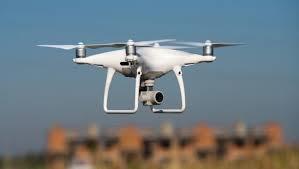News / National
Zimbabwe's CAAZ licenses 400 drone pilots
08 Sep 2024 at 08:27hrs |
0 Views

The Civil Aviation Authority of Zimbabwe (CAAZ) has licensed over 400 drone pilots and certified more than 15 companies for the use of drone technology across various sectors. These certifications reflect the growing interest in drone applications in agriculture, healthcare, construction, mining, and other industries. This rise in demand demonstrates the increasing significance of drone technology in supporting various economic activities in Zimbabwe.
According to CAAZ senior flight operations inspector Mr. Alex Chiduwa, acquiring a remote pilot's licence requires formal training at an approved facility. There are currently three such schools in Harare where aspiring drone pilots must undergo theoretical instruction, followed by an examination conducted by CAAZ. This structured training is aligned with international standards to ensure safe and compliant drone operations across different sectors.
Mr. Chiduwa emphasized that even for recreational drone use, a licence is required. All drone operators, whether for private, corporate, or non-profit purposes, must register their drones and obtain a pilot's licence. Those seeking to operate drones commercially or for profit must acquire a remotely piloted aircraft systems operator certificate, ensuring they meet the legal and safety standards set by CAAZ.
With the surge in drone usage, there has also been an increase in illegal drone operations and the sale of drones without proper documentation. Mr. Chiduwa highlighted the importance of adhering to regulations, as outlined in Section 55 of the Civil Aviation (Remotely Piloted Aircraft) Regulation. Violators face penalties such as fines or imprisonment. Law enforcement has frequently requested CAAZ to clarify regulations when operators are found without the required licences.
Drone technology has become an essential tool in agriculture, allowing farmers to map fields and spray crops more efficiently. It is also used for surveillance, recreation, mining, and tourism, showcasing its versatility across various industries in Zimbabwe. With proper regulation and enforcement, drones can continue to contribute to the country's technological and economic advancements.
According to CAAZ senior flight operations inspector Mr. Alex Chiduwa, acquiring a remote pilot's licence requires formal training at an approved facility. There are currently three such schools in Harare where aspiring drone pilots must undergo theoretical instruction, followed by an examination conducted by CAAZ. This structured training is aligned with international standards to ensure safe and compliant drone operations across different sectors.
Mr. Chiduwa emphasized that even for recreational drone use, a licence is required. All drone operators, whether for private, corporate, or non-profit purposes, must register their drones and obtain a pilot's licence. Those seeking to operate drones commercially or for profit must acquire a remotely piloted aircraft systems operator certificate, ensuring they meet the legal and safety standards set by CAAZ.
With the surge in drone usage, there has also been an increase in illegal drone operations and the sale of drones without proper documentation. Mr. Chiduwa highlighted the importance of adhering to regulations, as outlined in Section 55 of the Civil Aviation (Remotely Piloted Aircraft) Regulation. Violators face penalties such as fines or imprisonment. Law enforcement has frequently requested CAAZ to clarify regulations when operators are found without the required licences.
Drone technology has become an essential tool in agriculture, allowing farmers to map fields and spray crops more efficiently. It is also used for surveillance, recreation, mining, and tourism, showcasing its versatility across various industries in Zimbabwe. With proper regulation and enforcement, drones can continue to contribute to the country's technological and economic advancements.
Source - The Sunday Mail
Join the discussion
Loading comments…






























